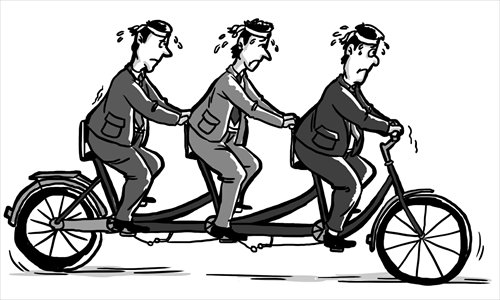Diplomatic shift shows Tokyo’s tensions

A new set of faces is about to emerge on the frontlines of Japan's diplomacy. Three top career officials of the Ministry of Foreign Affairs of Japan (MOFA) will rotate to manage the country's most important strategic relationships. All three are seasoned diplomats, and their skills will be much needed at this most difficult moment for Tokyo's foreign policy.
Kenichiro Sasae, MOFA's current vice minister, is heading for Washington. Sasae has spent the last decade in Tokyo, leading the ministry's bureaus of economic and Asian and Oceanic affairs and serving as deputy minster. He is well known in Washington for his deft role in the Six-Party Talks with North Korea, and for his steady hand in the strategic management of Tokyo's important adjustment to China's rise.
Shinichi Nishimiya, the current deputy foreign minister, will serve in Beijing. Interestingly, Nishimiya is one of Tokyo's star North America hands, reflecting again the new generation of Japanese diplomats who work across regional lines. He has headed the North American Affairs Bureau and served as the consul general in New York. Likewise, Koro Bessho, the new ambassador to Seoul, is not a Korea hand, but rather brings to the table his considerable experience in Japan's global strategy formulation.
Japan's recent tensions with South Korea, its continuing effort to manage the complex relationship with a rising China, and its long-standing effort to strengthen its alliance with the US make these three assignments critical. These three diplomats will move out into the field having worked effectively over the past year as MOFA's leadership team. The simultaneity of Japan's current challenges makes the close relationship among these three men an invaluable asset.
But there are several other dimensions to this new fall lineup that are noteworthy. Japan's diplomacy is under tremendous scrutiny at home. For the past decade, Japan's foreign policy has increasingly been subject to intense political critique. Since the revelations that Japanese citizens, abducted by Pyongyang, were still alive in North Korea, the Japanese public has become very sensitive to its government's handling of its relations with other countries.
Growing public concern about China's rise and its consequences for Japan have complicated the bilateral relationship, and public sentiments over US military bases in Japan have also led to the difficulty in managing the US-Japan alliance.
Growing political rivalry in Tokyo has also made foreign policy now part of the mix in election campaigns. The Democratic Party of Japan (DPJ), when it was in opposition, took aim at Japan's decision to refuel coalition forces in the Indian Ocean. It was also perceptions of foreign policy blunders that became fodder for opposition criticism of the DPJ itself after it entered power. This fall, expect the current territorial disputes to be on the campaign agenda across the political spectrum.
Politicians have become heated critics of Japan's diplomacy, and more often than not, this has led to intense pressure on the country's diplomats.
Japan's MOFA bureaucrats have found themselves in standoffs with political leaders on many occasions. Careers have been abruptly and unfairly ended, and this has weakened the relationship between Japan's diplomats and politicians.
Japan's transition to alternating political parties in power, after decades of dominance by one party, has raised questions about how the country's ability to craft strategy in a quickly transforming regional environment will be affected. Alliance tensions with Washington during the Yukio Hatoyama administration are a case in point. Tokyo's neighbors are increasingly pushing at boundaries that have in the past been carefully managed so as to avoid conflict and distress to the broader relationships.
But frankly, Japan is currently feeling under siege. Russia to the north, South Korea to the east, and China to the southwest are all taking aim at the diplomatic premises that were the foundation of Japan's postwar strategy. Half a century after Japan surrendered in August of 1945, it seems as if the antagonisms of the past have been given a new life. In Seoul and Moscow, political opportunity seems to have trumped strategic thinking, but in Tokyo, there is a sense of crisis about what these simultaneous eruptions of antagonism mean.
The territorial disputes themselves differ, but for Tokyo, this raises questions about whether or not the negotiated settlements with Seoul and Beijing can be transformed into strategic partnerships for the future of Northeast Asia. Full engagement with the governments and with the people, especially in South Korea and China, will be a must.
For China, South Korea and the US, the arrival of these new envoys should be seen as an opportunity not just to welcome some of Japan's best strategic practitioners, but also as a chance to engage in a broader conversation about how they can work together effectively to resolve current tensions and build a durable foundation for peace and prosperity in the Asia Pacific region.
The author is a senior fellow for Japan studies at the Council on Foreign Relations. opinion@globaltimes.com.cn